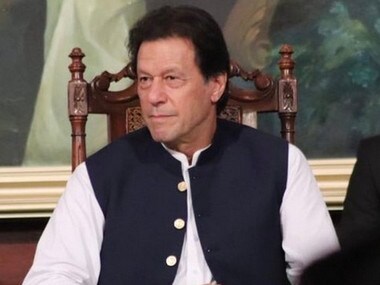With the abrogation of Article 370 in Jammu and Kashmir, two major shifts occurred in South Asia: India is partially on the defensive following allegations of human rights violations in Jammu and Kashmir; Pakistan, thus far pushed into a corner amid global pressure due to its policy of sheltering terrorists, is actively volleying at all available global platforms to ‘internationalise’ the Kashmir issue. This has offered Islamabad a window to return to its time-tested policy of pushing terrorists into Indian territory to foment trouble without attracting much global scrutiny. Meanwhile, Indian attempts to redirect attention to Pakistan’s rogue behaviour are unlikely to be as effective as before — at least for the time being — with the world worried over communication blockade and heavy military presence in Kashmir and the perceived threat of an actual war between the two nuclear-armed neighbours. [caption id=“attachment_7277201” align=“alignleft” width=“380”]  File image of Imran Khan. Twitter@PTIofficial[/caption] Pakistan camouflaging its terror bid After India stripped Kashmir of the semi-autonomous status it enjoyed for almost 70 years, Pakistan’s reaction, at least visibly, was of limited hand-wringing. Prime Minister Imran Khan made statements like “ we will never ever start a war with India” and “ any Pakistani who goes to fight jihad in India is enemy of Kashmiris”, implying Pakistan to be the more responsible State against what he calls Indian aggression. Simultaneously, he vowed to “forcefully raise” Kashmiri cause on all legitimate global platforms. Imran even ruled out jihad as an option in dealing with India, while addressing local journalists.
In a briefing to anchorpersons on #Kashmir, Prime Minister Imran Khan ruled out the use of jihadi organisations in IOK “There are more disadvantages than advantages,” he said.
— Amber Rahim Shamsi (@AmberRShamsi) August 8, 2019
But in its backyard, known terrorist modules continue to find shelter , support, and legitimacy. Indian intelligence agencies have been flagging persistent attempts by terror groups — with the prompting of Pakistan military and its Inter-Service Intelligence agency — to stage a major attack against Indian security installations since the 5 August nullification of Jammu and Kashmir’s special status. Pakistani spies have been arrested from border areas, its drones were seen flying in Indian territory, and although the frequency ebbs and flows, cross-border infiltrations continue to be a constant. All this is unsurprising to those tracking south Asian geopolitics as Pakistan’s reaction is in line with its time-tested policy of waging asymmetric war when it cannot afford to beat India in a conventional one. And as India obliterated the scope of ‘dispute’ at least from the Indian side of Kashmir by stripping off whatever token autonomy the state enjoyed, Pakistan had very few options left. With its economy teetering on the verge of collapse, imposing the cost of conventional military aggression and the resulting retaliation on taxpayers is out of the question for Islamabad. In such a situation, bleeding India by a thousand cuts through its many proxies has proven to be a much cheaper way to keep New Delhi engaged, and keep enough going in Kashmir to ensure it stays in international headlines. A prolonged period of peace, like in early 2000s, means the issue falls into oblivion in the international arena, and that is counterproductive to Pakistan military’s interests. Furthermore, most of Pakistan’s international allies have either stayed silent or sided with India: possibly looking at the differential between sizes of Indian and Pakistani economies and thereby the promise of trade from both nations. The only exceptions are China, Iraq, and Turkey. With Washington heavily dependent on Islamabad for the withdrawal of US troops from Afghanistan, Pakistan had calculated that the US could back it up on the Kashmir issue. But this too backfired with the changing dynamics in US politics. A beleaguered leader facing impeachment, Donald Trump seeks every vote he can get for re-election, and the Indian-American community sure is influential. Trump wouldn’t want to forsake the community by siding with Pakistan. However, Pakistan does count on Trump to look the other way as Pakistani support is indeed crucial for bringing now-collapsed negotiations with Afghan Taliban back on track, which in turn is crucial for Trump’s agenda of withdrawing troops from the West Asian country. Also, Pakistan has recently offered to mediate between Iran and the US, which have been at loggerheads since Trump ended the nuclear deal. Meanwhile, with a looming trade war, India and US have their own differences to iron out, in spite of the visible camaraderie between Narendra Modi and Trump. However, this is not to say that Pakistan is not playing with fire by trying to pump terrorists in India. Pakistan faces a huge challenge at the Paris-based Financial Action Task Force (FATF) in November. It failed to implement reforms to curb terror financing and corruption by a January deadline and then again by a May deadline. The November inquiry is its final chance and it must get off of the FATF’s grey-list or avoid being put on the blacklist, or it’s already tattered economy will further suffer from sanctions. The Diplomat reported that Islamabad received assurances that the US will not undermine Pakistan’s case at the FATF in return for its support in Afghan peace talks. However, the cancellation of talks can seriously challenge the endurance of the US promise. If three countries raise objections against the blacklisting proposal, it will be rejected, but right now China is the only sure-shot supporter of Pakistan.


)

)
)
)
)
)
)
)
)



